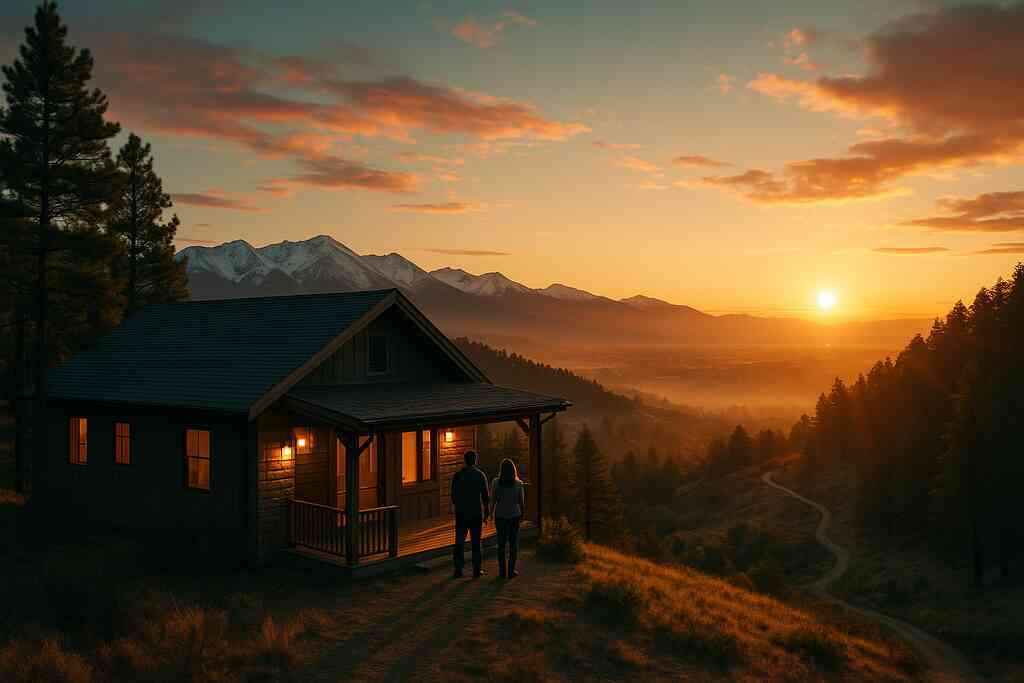
What Makes Sober Living in Montana Unique?
September 10, 2024
Introduction to Sober Living in Montana
The beauty of Montana is the perfect backdrop for recovery
The picturesque landscapes and tranquil environments of Montana provide a serene backdrop ideal for the journey of recovery. Montana’s vast open spaces, towering mountains, and crystal-clear lakes embody a sense of peace and solitude. This breathtaking scenery offers individuals in recovery a unique opportunity to connect with nature, facilitating a deep, introspective journey toward sobriety. Outdoor activities, such as hiking, fishing, and wildlife watching, play a significant role in healing, promoting both physical and mental wellness. In Montana, the natural world surrounds sober living homes, enhancing the recovery experience with its inherent calm and beauty.
Overview of Montana’s unique sober living environment
Montana’s sober living environment is distinctively characterized by its integration of natural beauty and community-driven support. Unlike urban centers, Montana provides a tranquil and secluded setting that aids individuals in focusing wholly on their recovery without the distractions often found in larger cities. Here, sober living houses foster a supportive network grounded in the principles of mutual respect, accountability, and personal growth. Residents engage in a daily routine that balances structured recovery programs with leisure time spent exploring the immense beauty of the region. This unique blend of communal living and nature-based healing makes Montana a highly sought-after location for those seeking sobriety in a wholesome and nurturing environment.
Why Montana is becoming a popular choice for sober living
Montana is steadily gaining popularity as a preferred destination for sober living due to its exceptional recovery-oriented community and the holistic healing opportunities its environment offers. The state’s dedication to fostering a supportive network for individuals in recovery is evident in the proliferation of high-quality sober living homes and the wide range of addiction recovery resources in Montana. Additionally, the emphasis on incorporating outdoor activities into recovery plans aligns with modern holistic approaches to wellness, resonating with many seeking a more profound and natural path to sobriety. The growing reputation of Montana’s recovery community, combined with its unique approach to integrating therapeutic outdoor experiences, positions it as a top choice for those committed to achieving long-term sobriety within a supportive and enriching environment.
The Unique Elements of Montana Sober Living Homes
Integration of outdoor therapeutic activities
Montana offers a unique recovery journey that integrates outdoor therapeutic activities seamlessly into the sober living experience. The region’s pristine natural landscapes are not just a backdrop but actively participate in the recovery process. Hiking, fishing, and mindfulness exercises in the open air are woven into the daily routines of residents, providing them with a direct connection to the healing power of nature. Such activities not only promote physical health but also mental and emotional well-being, contributing significantly to the holistic approaches to recovery in Montana. The emphasis on engaging with the outdoors elevates the recovery experience, offering residents a refreshing and invigorating route to sobriety that is deeply connected to the land itself.
Outdoor therapeutic activities in Montana are not just about leisure; they’re a key part of the recovery curriculum. Residents can participate in wilderness therapy sessions, group hikes, and other outdoor events designed to build resilience, self-esteem, and a sense of community. These experiences provide vital skills and insights that are essential for sobriety and life. The connection to nature aids in reflection and personal growth, making Montana’s sober living homes a sanctuary for those seeking healing in its most natural form.
Peer support networks in the Montana Recovery community
In Montana, the sober living experience is significantly enhanced by strong peer support networks within the recovery community. These networks offer a foundation of shared experiences and mutual understanding, which is essential for navigating the challenges of sobriety. Community activities, support group meetings, and shared responsibilities within the sober living homes foster a sense of belonging and collective purpose. Residents learn from each other, gaining strength from the victories and setbacks shared by their peers. The Montana Recovery Community support system is a vital resource, offering both emotional support and practical advice for living a sober life.
The essence of this peer support is evident in the communal living arrangements and group activities designed to encourage open communication and camaraderie. Through this vibrant community network, individuals find not just accountability partners but also lifelong friends who understand the journey’s depth. This collaborative environment ensures that no one has to face their recovery journey alone, highlighting the importance of community in achieving and maintaining sobriety.
Privacy and tranquility in Montana’s sober living settings
Privacy and tranquility stand out as cornerstone features of Montana’s sober living homes, offering residents a peaceful retreat where they can focus fully on their recovery. The state’s vast landscapes and sparse population mean that sober living homes are nestled in quiet, secluded areas that ensure privacy for all residents. This tranquil environment is essential for meditation, reflection, and personal growth, which are crucial to recovery. The natural surroundings and quiet settings contribute to a therapeutic peace of mind, making it easier for residents to work through the challenges of early recovery without the stress and distractions of a busy urban setting.
Montana’s sober living homes are designed to be sanctuaries of healing, where the tranquility of the environment is reflected in the calm and focused lives of its residents. Each home is a safe space where individuals can explore their new sober identity, supported by both the silence of nature and the strength of a compassionate community. This emphasis on privacy and peace makes Montana an ideal choice for those seeking a serene backdrop to their recovery journey.
Benefits of Sober Living in Montana
Montana’s Serene Recovery Settings Enhancing Sober Living
Montana’s serene recovery settings play a significant role in enhancing the sober living experience. The state, known for its vast landscapes and tranquil environments, offers a peaceful retreat for those on the journey of recovery from substance use disorder. The Montana serene recovery settings provide an ideal atmosphere for meditation, reflection, and engagement in personal growth activities. Residents can immerse themselves in the beauty of nature, which acts as a soothing backdrop for their healing process. This connection with nature is not only therapeutic but also aids in reducing stress and promoting mental health, making Montana’s sober living homes a nurturing space that fosters recovery. The tranquility of the environment is conducive to self-exploration and discovery, crucial elements in the journey towards sobriety.
The Role of a Supportive Environment in Substance Use Disorder Recovery
A supportive environment is critical in the recovery from substance use disorder. In Montana, sober living homes are designed to offer just that supportive, nurturing, and non-judgmental space where individuals can focus on their recovery journey. The sense of community within these homes is strong, with a network of peers who understand the challenges and victories of recovery. This peer support, coupled with substance use disorder support in Montana, provides residents with a comprehensive system of encouragement and accountability. Activities and programs are designed to reinforce the importance of building healthy relationships, learning coping skills, and developing life strategies that sustain recovery. The emphasis on a supportive environment enhances the effectiveness of the recovery process, as individuals feel they are part of a community that cares about their well-being and success.
Long-term Sobriety Through Montana’s Holistic Recovery Approaches
Achieving long-term sobriety is a multifaceted process that requires more than just abstinence from substance use; it necessitates a holistic approach to healing. Montana’s sober living homes integrate this belief by incorporating various therapeutic activities and lifestyle practices that address the physical, emotional, and spiritual aspects of recovery. From wilderness therapy for addiction recovery in Montana to mindfulness and meditation exercises set against the backdrop of Montana’s natural beauty, these holistic recovery approaches play a pivotal role in sustaining long-term sobriety. The focus is on equipping residents with tools and experiences that foster personal growth, self-awareness, and a profound connection to their environment. This comprehensive approach ensures that individuals are not only prepared to live substance-free but are also empowered to lead fulfilled, balanced lives in sobriety.
Specialized Programs and Services in Montana Sober Houses
Unique Sober Living Programs Montana Offers
Montana’s approach to sobriety transcends traditional recovery models, offering unique programs that leverage both the state’s rich natural resources and its community’s expertise in substance use disorder recovery. These programs are designed not just to maintain sobriety but to transform lifestyles, cultivating habits and skills that enrich the lives of participants long after they leave. Among the most notable are holistic wellness programs that integrate physical fitness, nutrition, and mental health practices, ensuring that residents of sober living houses in Montana receive a comprehensive recovery experience. Additionally, vocational training and educational workshops are frequently available, aiming to equip residents with the tools necessary for successful reintegration into society, a testament to the state’s commitment to fostering long-term recovery and personal development.
Wilderness Therapy and Its Impact on Addiction Recovery
Wilderness therapy represents a cornerstone of Montana’s sober living experience, embodying a unique convergence of adventure, introspection, and healing. This form of therapy leverages the untamed beauty and challenges of Montana’s landscapes to facilitate deep personal growth and self-discovery. Participants engage in structured outdoor activities, such as backpacking, rock climbing, and river rafting, guided by skilled professionals who help translate these experiences into lessons on resilience, teamwork, and self-reliance. The immersion in nature also serves as a powerful antidote to the isolation and disconnection often experienced in addiction, helping to restore the emotional and spiritual well-being necessary for a fulfilling, sober life. The tangible skills and profound insights gained through wilderness therapy significantly enhance the substance abuse recovery process, making it a pivotal component of Montana’s sober living programs.
Outdoor Recreational Activities for Early Recovery Resources
Beyond the structured setting of wilderness therapy, Montana also offers a wealth of outdoor recreational activities that serve as vital early recovery resources. From fishing in the serene rivers to hiking the majestic Rocky Mountains, these activities provide residents with healthier leisure options and a constructive outlet for stress and anxiety. Engaging with the natural world in a recreational context helps foster a sense of peace and joy, crucial elements in the early recovery stages marked by emotional volatility and the challenges of adjusting to a sober lifestyle. Furthermore, such activities encourage social bonding among residents, strengthening the peer support that is so essential in achieving long-term sobriety. By integrating outdoor recreation activities for recovery in Montana, sober living homes ensure that residents have access to a healing environment that nurtures both body and spirit, setting a solid foundation for a lifetime of sobriety.
Understanding the Sober Living Environment in Montana
House rules ensure a safe and sober environment.
Establishing a safe and sober environment is paramount for recovery, an endeavor where sober living house rules play a crucial role. In Montana, sober living homes adopt a structured set of laws aimed at promoting a lifestyle conducive to recovery from substance use disorders. These rules often include strict no-use policies regarding alcohol and drugs, curfews to encourage a responsible lifestyle, and mandates for participation in house meetings and chores. Such regulations ensure a disciplined environment, fostering mutual respect among residents. By adhering to these principles, individuals in recovery find a supportive framework that builds the foundation for lasting sobriety and personal accountability.
The importance of a daily routine in early recovery
Early recovery is a period marked by significant adjustment, making the establishment of a daily routine a critical aspect of the sober living experience. In Montana’s serene settings, residents are encouraged to structure their days, incorporating activities such as therapeutic sessions, outdoor exercises, and personal reflection time. This predictability helps manage the unpredictability of emotions and challenges faced during early recovery, providing a sense of normalcy and stability. Engaging in a routine also aids in re-establishing healthy habits, which are vital for managing stress and avoiding triggers. Furthermore, structured days allow individuals to make tangible progress in their recovery journey, reinforcing the value of discipline and consistency in achieving long-term sobriety.
Role of house managers in maintaining sober house rules Montana
House managers play an integral part in the seamless operation of sober living homes in Montana, ensuring the establishment and maintenance of a stable, supportive environment. These individuals are responsible for enforcing house rules, facilitating group meetings, and offering guidance to residents. Their presence is essential for creating an atmosphere of safety and accountability, where residents adhere to established guidelines while feeling supported in their recovery journey. House managers often act as liaisons between residents and external support systems, assisting with the coordination of therapy sessions, outpatient programs, and support groups for alcohol addiction in Montana. Through their leadership and oversight, house managers uphold the integrity of the sober living environment, playing a pivotal role in the residents’ path toward recovery.
Support Systems and Recovery Resources in Montana
Access to Alcoholics Anonymous and Other Support Groups
Montana offers a plethora of support systems crucial for individuals navigating the path to sobriety. Among these, access to Alcoholics Anonymous meetings near sober living in Montana and other similar support groups stands out as a vital component of the recovery ecosystem. Alcoholics Anonymous (AA) and other group meetings provide a platform for shared experiences, hardships, and victories, fostering a sense of community and belonging. This supportive environment encourages openness, allowing individuals to express their struggles and achievements freely without fear of judgment. Additionally, Montana’s sober living homes often incorporate these meetings into their residents’ routines, highlighting the importance of collective support in overcoming addiction. The presence of diverse support groups ensures that every individual’s unique needs are addressed, offering specialized assistance for a range of substance dependencies and co-occurring mental health conditions.
Outpatient Program Collaborations with Sober Living Homes
Collaboration between sober living homes and outpatient programs in Montana significantly enhances the recovery experience for residents. These partnerships are designed to provide comprehensive care, bridging the gap between structured living environments and intensive therapy sessions. Outpatient programs offer crucial continuity of care, ensuring that residents receive consistent, specialized treatment tailored to their recovery needs. Services such as individual counseling, group therapy, and life skills workshops equip individuals with the tools necessary to navigate the challenges of sobriety. By integrating these services, sober living homes and outpatient programs create a cohesive support system that emphasizes holistic healing, addressing both the psychological and practical aspects of addiction recovery. This collaborative approach ensures that residents have access to a broad spectrum of recovery and therapy options, supporting their journey toward long-term sobriety.
The Importance of 12-Step Meetings and Programs in Recovery
12-step meetings and programs are a cornerstone of substance abuse recovery in Montana, embodying a structured yet flexible framework for addressing addiction. The twelve-step model provides a set of guiding principles for personal recovery, promoting spiritual growth, character development, and social responsibility. Participation in these programs, such as those facilitated by Alcoholics Anonymous, offers individuals a systematic approach to sobriety, encouraging introspection, amends-making, and ongoing self-evaluation. Moreover, the communal aspect of twelve-step programs for sobriety fosters a supportive network of peers who share similar experiences and goals. This camaraderie is instrumental in reinforcing the commitment to recovery, providing both motivation and accountability. Through regular engagement in 12-step meetings, individuals in Montana’s sober living homes gain access to a wealth of knowledge and experience, further enhancing their ability to achieve and maintain sobriety.
Testimonials from Residents of Sober Living Homes in Montana
Personal Recovery Journeys and The Road to Long-Term Sobriety
Montana’s pristine landscapes and thriving recovery community have paved the way for many to journey toward long-term sobriety with hope and resilience. Residents often speak of the transformative impact that the unique combination of peer support, engagement with nature, and individualized care has had on their recovery process. One resident shared how their “journey from the depths of addiction to the peak of Montana’s serene recovery settings has been both a literal and metaphorical ascent.” Encouraged by the abundant natural beauty and a supportive environment, individuals often find that the road to sobriety in Montana is filled with moments of profound personal growth and discovery.
Regular involvement in outdoor therapeutic activities and the quiet reflection provided by the tranquil environment serve as keystones in the recovery process. Another testimonial highlighted, “The integration of hiking and wilderness therapy into our sober living program offered me not just escape but engagement – with the world, with my peers, and most importantly, with myself.” These experiences are echoed by many who have found solace and strength in the shared journey towards sobriety, underpinned by the holistic recovery approaches Montana is known for.
The Impact of a Supportive Environment on Recovery Success
For many residents of Montana sober homes, the supportive environment forms the backbone of their recovery success. Testimonials often highlight how the close-knit community and the emphasis on peer support have provided a foundation of strength and encouragement. “Living in a community where everyone understands the challenges of recovery created a space where I felt truly understood for the first time,” one resident reflected. This sense of belonging, combined with the natural and peaceful setting, contributes to a nurturing atmosphere conducive to healing.
Montana sober homes are renowned for fostering an environment where individuals can thrive, buoyed by mutual respect and shared goals. Through group homes and Alcoholics Anonymous sobriety meetings, residents build lasting relationships that support them through recovery and beyond. The guidance and oversight of house managers further ensure a safe and structured environment, enabling residents to focus on their personal growth and sobriety goals.
Experiencing the Unique Sober Living Amenities in Montana
The unique amenities offered by Montana sober living facilities significantly enhance the recovery experience. From beautifully appointed homes that provide comfort and privacy to the vast selection of outdoor and therapeutic activities, the amenities are designed to heal both the body and the soul. “The ability to step out my door and be in the heart of nature has been invaluable to my recovery,” shared one individual, underscoring the benefits of the unique sober living amenities in Montana. Access to wilderness therapy, coupled with comprehensive mental health support in sober living, provides a robust framework for residents to work on their recovery in a holistic and fulfilling manner.
Individuals in Montana’s sober living homes often talk about the impact that the special combination of privacy, community, and engagement with nature has had on their recovery. The amenities, including spacious living areas, meeting rooms for group therapy, and expansive outdoor spaces, are carefully curated to support every aspect of recovery. These testimonials from residents highlight the effectiveness of Montana’s unique approach to sober living, offering insights into the profound impact that the environment and community have on facilitating a journey toward long-term sobriety and a fulfilling life in recovery.
Conclusion: Why Choose Montana for Your Sober Living Journey
Summarizing the key benefits of Montana sober housing
Montana offers a unique and effective path to sobriety that is distinct from other locations. The combination of its serene natural environment, strong community support, and tailored recovery programs create an ideal setting for individuals dedicated to overcoming substance use disorders. The tranquil settings across Montana provide a peaceful backdrop, essential for reflection and healing, bolstering the journey to sobriety. Holistic approaches that include outdoor therapeutic activities not only aid in physical wellness but also play a crucial role in mental and emotional recovery. Furthermore, the culture of peer support in recovery communities throughout the state encourages lasting connections and mutual growth, elements critical to maintaining long-term sobriety.
How Montana supports alcohol addiction help and substance abuse recovery
The state of Montana’s commitment to offering comprehensive support for alcohol addiction help and substance abuse recovery is unparalleled. Residents have access to a wide range of resources, from outpatient program collaborations with sober living homes to involvement in 12-step meetings and programs, which are integral for building a solid foundation in recovery. These programs are designed to address the complexities of addiction, offering personalized care that considers the individual’s needs, history, and goals. Within this supportive framework, individuals find the professional guidance and peer encouragement necessary to navigate the hardships of recovery and celebrate the successes along the way.
Making the decision for a sober future in Montana’s recovery community
Choosing sober living in Montana means embracing a community and lifestyle that is oriented towards fostering healthy, sober lives. The state’s recovery community is active and welcoming, providing newcomers with the resources and support they need from day one. Whether it’s the majestic natural surroundings that inspire tranquility and introspection or the specialized recovery programs that address the multifaceted needs of individuals in recovery, Montana stands out as a premier destination for those seeking sobriety. Making the decision for a sober future in Montana’s recovery community is a commitment to a journey of transformation and growth, supported by an environment that understands the importance of a holistic approach to recovery. Embracing this path can be the first step towards a life of fulfillment, well-being, and long-term sobriety, backed by the strength and solidarity of a vibrant and caring recovery community.
Frequently Asked Questions
Question: How does Top Sober House integrate outdoor therapeutic activities into its Montana sober living environment?
Answer: At Top Sober House, we believe that the healing power of nature is an essential component of recovery. In our Montana sober homes, residents have the unique opportunity to engage in a variety of outdoor therapeutic activities that are integral to the sober living experience we offer. From guided wilderness therapy sessions to serene fishing trips and reflective hikes through Montana’s majestic landscapes, each activity is designed to support residents’ physical, mental, and emotional well-being. We recognize that connecting with nature can significantly enhance the recovery journey, promoting long-term sobriety and personal growth. Our programs aim to harness the tranquil Montana sober living environment, allowing residents to explore and rebuild their lives within a supportive and enriching setting.
Question: What makes Top Sober House’s approach to peer support in Montana’s recovery community unique?
Answer: Top Sober House prides itself on fostering a robust peer support network within our Montana recovery community. What sets us apart is our commitment to creating a truly supportive environment that understands the value of shared experiences. Our Montana sober living houses are more than just places to live; they are communities where residents connect, share, and grow together. We facilitate regular group meetings, therapeutic activities, and community-building events to ensure that everyone feels valued and understood. Our unique approach to peer support in Montana encourages a sense of belonging, mutual respect, and accountability among residents, which are crucial elements for maintaining sobriety and fostering long-term recovery success.
Question: Can you explain the types of sober living environments Top Sober House offers in Montana and how they contribute to substance use disorder recovery?
Answer: At Top Sober House, we offer a range of sober living environments in Montana, each designed to cater to the various stages and needs of substance use disorder recovery. From more structured environments that provide a higher level of support and supervision for those in the early stages of recovery to more independent living situations for residents transitioning toward long-term sobriety, our sober houses are tailored to promote healing and growth. These environments emphasize a holistic recovery approach, incorporating structured daily routines, group therapy, and individual counseling. The serene, tranquil settings of our Montana sober homes offer privacy and solace, ideal for reflection and personal development. Combined with the supportive environment Montana is known for, our sober living care promotes a sense of community, accountability, and resilience, essential for overcoming substance use disorders and achieving lasting recovery.
Question: The blog post “What Makes Sober Living in Montana Unique?” mentions the integration of wilderness therapy. How does Top Sober House specifically implement this into its recovery programs?
Answer: In our feature “What Makes Sober Living in Montana Unique?”, we highlight the intrinsic value of wilderness therapy in the recovery process, a principle closely aligned with Top Sober House’s philosophy. Our implementation of wilderness therapy is both intentional and deeply integrated into our recovery programs. We partner with experienced professionals to lead residents on therapeutic expeditions into Montana’s breathtaking natural landscapes, using the challenges and beauty of the wilderness as catalysts for personal discovery and emotional healing. These activities, ranging from rock climbing to river rafting, are designed to build self-reliance, teamwork, and resilience. By facing and overcoming the obstacles presented by the natural world, residents develop coping skills and confidence that are vital for their journey to sobriety. This unique approach not only aids in physical and mental well-being but also reinforces the community bonds that are crucial for recovery in the supportive environment Montana offers.
Question: How does Top Sober House ensure the privacy and tranquility of its Montana sober living settings, considering these aspects are crucial for recovery?
Answer: Top Sober House understands that privacy and tranquility are crucial for effective recovery from substance use disorders, which is why we carefully select the locations of our Montana sober homes. Each home is strategically placed in serene settings that ensure peace and solitude, offering residents a haven where they can focus on their recovery journey without external distractions. We maintain strict house rules to preserve a sober, respectful, and supportive living environment. The design and daily operations of our homes are centered around creating a tranquil atmosphere, from quiet areas designated for reflection and meditation to community spaces that encourage peaceful interaction among residents. By prioritizing privacy and tranquility, Top Sober House helps residents in Montana engage in deep, meaningful recovery processes, supported by both the natural beauty of their surroundings and a nurturing community environment.




